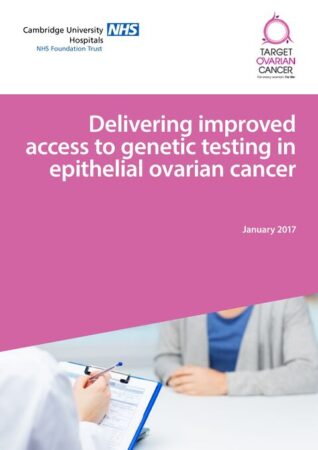Home Publications Reports Delivering improved access to genetic testing in epithelial ovarian cancer
Delivering improved access to genetic testing in epithelial ovarian cancer
Over 7000 women are diagnosed with ovarian cancer in the UK each year, the most common of which is epithelial ovarian cancer, accounting for approximately nine out of ten cases.
Both environmental and genetic factors have a causal role in the development of epithelial ovarian cancer; it is estimated that around 15-20% of all ovarian cancer cases arise from inherited mutations, with BRCA1 or BRCA2 mutations the most common. Knowledge of BRCA1 / BRCA2 mutation status is important to guide the therapeutic approach and identify unaffected, but at risk, family members who may then consider risk-reducing options. Traditionally, oncologists could refer women to clinical genetics where testing would be offered on the basis of risk assessment tools taking into account family history. However, a significant proportion of women with ovarian cancer and BRCA1 / BRCA2 mutations are not identified either because of a lack of referral for testing or because the risk assessment tools fail to identify some mutation carriers.
The GTEOC study assessed the acceptability to patients, and feasibility in terms of resources, of offering BRCA1 / BRCA2 testing to all women with newly diagnosed ovarian cancer without a prior assessment of risk in clinical genetics.
With the aim of highlighting the benefits of the GTEOC approach for other service providers who may consider implementing this within their own region, this report, produced by Cambridge University Hospitals NHS Foundation Trust and the PHG Foundation, describes the broader context of genetic testing and mainstreaming initiatives, the findings from the GTEOC research study, and the implementation of the NHS GTEOC service within the East Anglia region.
The report was made possible with funding from the NIHR Cambridge BRC and Target Ovarian Cancer.
By Louise Cameron, Inga Plaskocinska, Mark Kroese and Marc Tischkowitz

